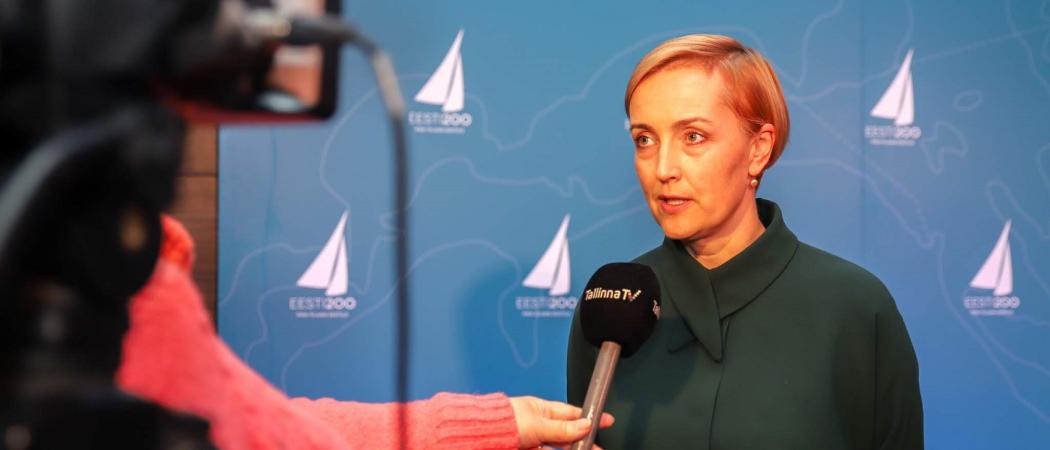Estonian candidate warns of tough budget talks and the possibility of political interference in research if populists win more seats in the European parliament

Kristina Kallas at the Estonia 200 general assembly in November 2018. Photo: Estonia 200
As a political scientist and Estonia 200 candidate in this week’s elections, Kristina Kallas is concerned that if right wing populists win more seats in the European Parliament, Horizon Europe budget talks could be “paralysed”, as uncertainty looms over the future of EU finances after the UK leaves.
Kallas, who resigned as director of the Narva College at the University of Tartu to enter politics, expects a heated budget debate and says it will be “very difficult” for the new parliament to deliver on the promise of a €120 billion budget for Horizon Europe, a figure that is €20 billion more than proposed by the European Commission. “I am a bit worried in terms of the composition of the next parliament,” said Kallas. “We think certain political forces will be demanding money for something else.”
The first item on the agenda for the new batch of MEPs will be to debate the EU’s 2012 – 2027 overall budget and figure out how to manage when the UK stops paying its current 13 per cent contribution.
Most immediately, the MEPs are faced with deciding by how much the cohesion and agriculture programmes should be cut in favour of Horizon Europe. The shift in funds is proposed by the commission, but member states in central and Eastern Europe do not want to see the cohesion budget shrink, as it is one of their main sources of funding for infrastructure projects. Meanwhile, member states, such as Ireland and France, rely on EU subsidies to keep farming profitable and would oppose cuts to the agriculture budget in favour of the research programmes.
In any case, Kallas says Estonia 200 “would oppose taking money away from Horizon Europe,” since it is one of the areas where her party would like to see more European cooperation. Many members of her party are scientists and academics, and a significant part of their campaign programme is focused on how research and innovation contribute to economic competitiveness. “R&D has been one of the main topics addressed in Estonia 200,” said Kallas.
But very few voters in Estonia are interested in science and technology and most parties in the country don’t address these issues, said Kallas. “You can address three per cent of the population, the rest will be yawning.”
But these topics should be addressed nonetheless, Kallas argues, partly because right wing populists could use their political appeal to shift money away from science, and to influence the direction of research. Populists are prone to question the autonomy of certain disciplines in the social sciences - such as gender and multicultural studies - and research on globalisation, Kallas said. “That’s where they are vocally against,” she said.
Digital Europe
Besides a commitment to defend the EU research budget in the face of Brexit and a potential wave of populism, the main goal of Estonia 200 is to convince all member states to adopt e-government technologies. “Estonia has a vital and business interest in that,” said Kallas.
Estonia has invested massively in its ICT industry and has implemented some of the most advanced e-government technologies in the world. Back in 2000, the government decided to introduce electronic IDs, which are now used by nearly all its citizens to vote, pay taxes and open businesses online. The technology also helps doctors and pharmacists to keep track of health records and prescriptions.
Despite being successfully introduced at home, these technologies have not been adopted in other countries as quickly as the Estonians hoped. Kallas wants her party to convince other MEPs to vote for an EU-wide electronic ID system for each and every European citizen, a move which would speed up the consolidation of the digital single market. “Five hundred million electronic IDs would open up business opportunities and boost the digital economy,” she said.
Estonian IT companies have developed an enormous number of services based on the electronic ID, but they have a “limited capacity to sell those [in the EU],” because not all member states want the technology. For lack of opportunities in Europe, Estonian companies have been exporting e-government technologies to countries in central Asia.
In some EU member states, citizens sceptical of these technologies worry about the security of their personal data and the potential for governmental surveillance that electronic IDs generate. “I understand the argument on anonymity,” said Kallas, noting the risk of an electronic ID being hacked can be reduced. In the end, “It is in Estonia’s interest to keep pushing countries to trust [e-government technologies] more.”





 A unique international forum for public research organisations and companies to connect their external engagement with strategic interests around their R&D system.
A unique international forum for public research organisations and companies to connect their external engagement with strategic interests around their R&D system.